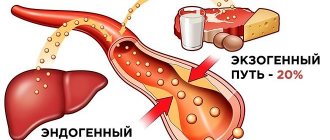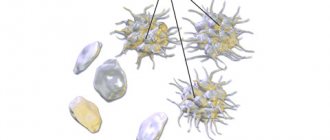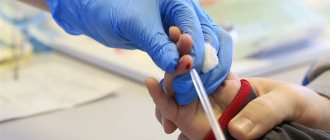| Author of the article: | |
| Sleptsov Ilya Valerievich, Doctor of Medical Sciences, endocrinologist surgeon, professor of the Department of Faculty Surgery of St. Petersburg State University, deputy director for medical affairs of the St. Petersburg Multidisciplinary Center of the Ministry of Health of the Russian Federation, member of the European Thyroidological Association, European Association of Endocrine Surgeons | |
| If you have been diagnosed with medullary thyroid cancer that requires surgical or chemotherapy treatment, or an increase in blood calcitonin levels, you can contact Ilya Valerievich Sleptsov by phone +7 921 9517088 to receive recommendations for diagnosis and treatment |
Calcitonin – what is it?
It is a thyroid hormone produced by C cells located among the follicles formed by A and B cells. C-cells are cells of neuroendocrine origin that “come” to the thyroid tissue during human prenatal development. The hormone calcitonin is believed to be the main product of C-cell production.
Among all the thyroid hormones, the hormone calcitonin stands apart. Its function is still under study, the cells that produce it are in the clear minority in the thyroid tissue, but the importance of this thyroid hormone is not to determine how well the gland is working, as is true in the case of the T4 and T3 hormones. Calcitonin is a tumor marker, and this is its main role in modern medicine.
In all manuals and textbooks, the hormone calcitonin is considered as a kind of antagonist of parathyroid hormone produced by the cells of the parathyroid glands (it would be more correct to say “parathyroid”). Parathyroid hormone activates special cells - osteoclasts, which destroy bone tissue and lead to the release of calcium from bone reserves into the blood. Other effects of parathyroid hormone are to enhance the reabsorption of calcium ions from primary urine, as well as to enhance the formation of the active form of vitamin D - calcitriol, which leads to increased absorption of calcium from the intestine into the blood. All effects of parathyroid hormone are aimed at increasing the concentration of calcium in the blood. The hormone calcitonin provides “counteraction” to parathyroid hormone, increasing the deposition of calcium in the bone beams and thus reducing the level of calcium in the blood.
However, in terms of the strength of its action, calcitonin is much weaker than parathyroid hormone, therefore it is incorrect to assume that the balance of metabolism in bone tissue is maintained solely by the balance of calcitonin and parathyroid hormone. Parathyroid hormone itself, when introduced into the body in small doses intermittently, can increase calcium deposition in the bones, so it is more correct to think that the mechanism for controlling calcium deposition in the bones is a very complex process in which both the hormone calcitonin and parathyroid hormone are involved, and vitamin D, and a host of lesser-known substances.
The thyroid gland produces the hormone calcitonin in very small quantities, so there is never much of it in the blood. It can also be produced in the intestines, but in very tiny doses.
In this article we will devote attention to the hormone calcitonin, as a tumor marker, as the basis for diagnosing a dangerous tumor - medullary thyroid cancer. Calcitonin is a tumor marker that allows one to confidently diagnose medullary cancer even in the early stages.
Blood test for calcitonin
Blood calcitonin is now determined by various laboratories using equipment of various classes to study the level of this indicator. The most modern analyzers, which give the calcitonin analysis maximum accuracy, are 3rd generation immunochemiluminescent analyzers. Widespread and cheap to operate and handle, 2nd generation enzyme immunoassay analyzers provide a significant error in determining the level of calcitonin in the blood, which can lead to incorrect actions both at the stage of examining the patient and at the stage of his treatment. That is why, if during a blood test, calcitonin is the main indicator you are interested in, ask the laboratory what method is used to perform the analysis.
The laboratory of the North-Western Endocrinology Center performs a blood test for calcitonin using an automatic 3rd generation immunochemiluminescent analyzer Liaison XL manufactured by DiaSorin (Italy)
– one of the world's largest manufacturers of equipment for studying blood hormone levels. The accuracy of calcitonin testing using the high-tech 3rd generation method is so high that it often eliminates the errors of tests performed by other laboratories using less modern methods. Very often, patients who have elevated blood calcitonin turn to the North-Western Endocrinology Center - and often a simple double-check of the results using precision equipment makes it possible to find out that in fact the hormone is within normal limits.
| Automatic immunochemiluminescent analyzer 3rd generation DiaSorin Liaison XL (Italy) | 3rd generation chemiluminescent immunoassay analyzer for determining blood calcitonin levels with maximum accuracy |
Why is calcitonin so interesting to endocrinologists and endocrinologist surgeons? The fact is that from the C-cells that produce this hormone, a very dangerous malignant tumor of the thyroid gland grows, which is called medullary cancer or C-cell carcinoma. Medullary cancer grows slowly (this is perhaps its only positive quality), but extremely stubbornly - it is not “afraid” of chemotherapy, with the exception of some drugs from the group of kinase inhibitors, and also does not accumulate radioactive iodine at all and does not respond to external beam radiation therapy. Medullary cancer actively metastasizes to the lymph nodes of the neck, mediastinum, and also spreads its metastases through the blood to the lungs, bones, liver, and brain. Early and timely surgery is the main thing that can bring victory over medullary cancer.
Due to the fact that C-cells, which are the basis for the growth of this type of cancer, produce the hormone calcitonin, its concentration in the blood increases sharply. It is this indicator that is used for the early diagnosis of medullary thyroid cancer. Calcitonin is a method that, if used correctly, can save thousands of human lives.
Currently, about 100-150 cases of medullary thyroid cancer are detected annually in Russia. Not long ago, summary data on the diagnosis of medullary cancer in 16 large and densely populated regions of the European part of Russia were published. Overall data showed that about 40 cases of medullary cancer are detected annually in this vast region. You may be surprised, but in 2013 alone, specialists from the Northwestern Endocrinology Center identified and treated 38 patients with medullary thyroid cancer
. It turns out that one center, albeit a large one, detects as many cases of C-cell cancer per year as 16 regions of our country - and the reason for this lies not only in knowledge of the intricacies of diagnosing this tumor, but also in the competent and active use of calcitonin as a tumor marker.
It should be noted that at present, almost all deaths of patients suffering from various forms of thyroid cancer are caused by medullary or anaplastic cancer. And if we still do not have an effective treatment for anaplastic cancer, medullary cancer is completely curable - and a blood test for calcitonin is designed to help with this.
After lengthy debate, in 2012 the European Thyroid Association in its recommendations indicated the need for a single calcitonin test for all patients with thyroid nodules. The test does not need to be done annually - if the first test shows that the hormone level is not elevated, the next test should be performed only if new nodes appear that were not previously recorded.
Large international studies have shown that when calcitonin levels are determined in all patients with thyroid nodules, previously unsuspected medullary cancer is detected in 1 case out of 300
. In this regard, the European endocrine community is inclined to believe that spending 299 times the money on analysis (and insurance companies pay for the examination there, not the patients themselves) is quite reasonable if, as a result, one patient is diagnosed with cancer at an early stage, when it is still can be cured. By the way, the American Thyroid Association has not yet supported this opinion - in the USA it is believed that such spending of money is unwise (we are talking about the economic efficiency of the method, not about its clinical significance and usefulness - no one has any doubts about this).
References
- Osteoporosis. Clinical recommendations. — Russian Association of Endocrinologists, 2021. — 107 p.
- Felsenfeld, A., Levine, B. Calcitonin, the forgotten hormone: does it deserve to be forgotten. - Clin Kidney J., 2015. - Vol 8(2). — P. 108-187.
- Danila, R., Livadariu, R., Branisteanu, D. CALCITONIN REVISITED IN 2021. - ActaEndocrinol (Buchar), 2021. - Vol. 15(4). — P. 544-548.
- Toledo, S., Lourenço, D., Santos, M. et al. Hypercalcitoninemia is not pathognomonic of medullary thyroid carcinoma. - Clinics (Sao Paulo), 2009. - Vol. 64(7). — P. 699-706.
Calcitonin is normal
When testing blood for calcitonin and assessing the results of this analysis, it should be remembered that there is no lower limit of normal for this hormone
. If its level in the blood is zero, this is also normal. It is important that it does not rise above those limits that are designated as the upper limit of normal for this particular analyzer and this particular set of reagents.
It doesn’t make much sense to indicate any specific norm for calcitonin here, since laboratories now use very diverse models of analyzers - this leads to the fact that the concept of norm in this case should not even be discussed. When you take a calcitonin test in a high-quality modern laboratory, the norm will be indicated on the same form - this rule is followed very strictly by good laboratories.
Preparatory stage
The patient should properly prepare for a calcitonin test as follows:
- It is necessary to donate blood for analysis on an empty stomach (avoid eating 12 hours before donating blood);
- eliminate fatty, spicy foods from your diet one day before;
- do not take oral contraceptives a month before the test;
- avoid heavy physical activity the day (24 hours) before donating blood for analysis, this also applies to emotional stress;
- immediately before donating blood, a 15-minute rest is advisable;
- You must not smoke 3 hours before the test.
Preparing for a calcitonin test involves the patient minimizing the influence of various factors that can affect the test result. Risk factors include:
- undergoing hormonal therapy with female sex hormones (estrogen);
- taking calcium supplements intravenously;
- alcohol consumption;
- significant physical activity;
- consuming significant amounts of carbohydrates, which increase insulin levels.
When calcitonin is elevated
Any situation where a patient has high calcitonin, regardless of the degree of its increase compared to the norm, is very serious and requires an in-depth examination with the participation of specialists with sufficient experience in diagnosing and treating medullary thyroid cancer.
It is important to understand that if a calcitonin level is detected that exceeds 100 pg/ml, the probability of the patient having medullary cancer is almost 100%. The higher the level, the more advanced the tumor, the higher the likelihood of detecting its metastases in the lymph nodes and distant organs, and the worse the prognosis for the patient.
If in a patient with thyroid nodules, according to fine-needle biopsy, all nodes are benign, and calcitonin in the blood is elevated, you should trust the analysis more, since the likelihood that this indicator is “lying” is small. If the hormone level is really high (i.e., exceeds 100), surgical treatment including complete removal of the thyroid gland with central cervical lymph node dissection (i.e., removal of the lymph nodes surrounding the thyroid gland) must be carried out without fail. You can understand for yourself how accurate the calcitonin test must be - after all, in such cases, the patient’s thyroid gland is removed based on the results of only one laboratory test! The situation with the treatment of such tumors is similar to flying an airplane in fog using instruments, when you can’t see anything around, and decisions about where to fly have to be made only on the basis of instrument readings in the cockpit...
It is worth mentioning another important feature of medullary cancer - in 30% of cases it has a hereditary distribution, and can be inherited by the patient’s children in 50% of cases. In these situations, the thyroid gland is removed in children under 5-7 years of age (and in some cases, during the first month of life!), when the tumor is just beginning to develop, and the calcitonin level is barely elevated. And in this case, only an accurate test for calcitonin can add confidence to doctors and the child’s parents that they are doing everything correctly.
The most difficult cases in diagnosing medullary thyroid cancer are associated with situations where the hormone is only slightly elevated - that is, the level is above normal, but below the number 100. In cases where there is a slight increase, we can talk about the presence of medullary cancer of a very small size (3-4 mm), and about the absence of a tumor - in this case, calcitonin is increased due to other reasons not related to cancer.
Both in cases where calcitonin is clearly and clearly increased, and in cases of questionable, insignificant increase, you should contact a specialized endocrinology center, where specialists will conduct additional clarifying studies, including:
- fine-needle biopsy of nodes under ultrasound control with determination of the calcitonin level in the washout from the puncture needle;
- conducting a stimulated calcitonin test with intravenous administration of calcium gluconate.
In this article, we will not discuss all aspects of diagnosing medullary cancer, since it is wrong for patients to independently identify it - this is fraught with mistakes, the cost of which can be life. The rules that you need to remember after reading this material are simple:
- calcitonin is a tumor marker
, this is its main significance
; - A blood test for the hormone calcitonin must be taken in all patients with
thyroid nodules; - the analysis should be taken in a specialized laboratory
that uses 3rd generation immunochemiluminescent analyzers and has sufficient experience in diagnosing medullary cancer; - any increase in the level of calcitonin in the blood should be a reason to contact a specialized endocrinology center
.
How to prepare for analysis
To test for calcitonin, venous blood is needed.
Rules for preparing for the study:
- We recommend donating blood between 8 and 11 am;
- blood must be donated on an empty stomach, after an 8-12 hour overnight fast;
- on the eve of the study - a light dinner with limited intake of fatty foods;
- on the day of the test, you can drink still water and it is better to avoid coffee and tea;
- 24 hours before the test, exclude alcoholic beverages;
- 1 hour before the test it is better to refrain from smoking;
- 24 hours before the study, exclude the use of medications (in consultation with the attending physician);
- 24 hours before the test, eliminate emotional and physical stress;
- You should not donate blood after radiography, ultrasound, massage, endoscopic and physiotherapeutic procedures;
- It is recommended to rest for 10-20 minutes before donating blood.
Where to go if calcitonin is elevated?
We encourage all patients whose blood analysis has revealed high calcitonin to contact the clinics of the North-Western Endocrinology Center
, who has the greatest experience in Russia in the treatment of medullary thyroid cancer. Specialists at the Northwestern Center will conduct clarifying studies and either reasonably exclude the diagnosis of C-cell cancer, or confirm it and perform surgery on you using the most modern technologies.
It should be noted that thyroid operations for residents of Russian regions are performed free of charge by the North-Western Endocrinology Center, within the framework of the federal quota program, or under a compulsory health insurance policy.
So, if your calcitonin is elevated, we are waiting for you
. Do not put off the examination for the future, it can be dangerous.









